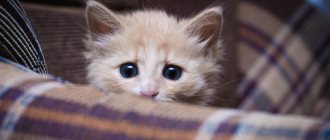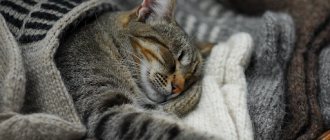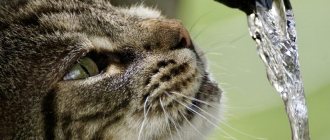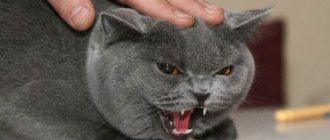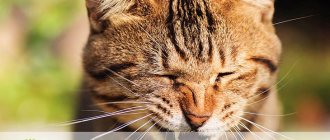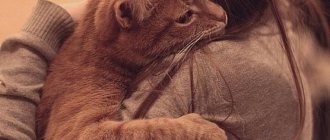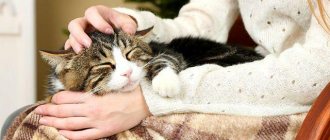Many owners have no doubt that their cats love them. But is a cat’s love for a person natural for her, innate, or is it the “fruit of upbringing”? Spoiler: both.
Photo: commons.wikimedia.org
Dr. Shannon Stanek, DVM, believes that, as with humans, a cat's love for a person (and the extent of its expression) depends on the cat's individual characteristics, as well as its previous experiences.
Moreover, according to this specialist, innate characteristics and experience are equally important. And the most important are the first months of life. Cats that have grown up in close contact with humans tend to be more affectionate and affectionate. Accordingly, stray kittens are more wild, since they have not had positive experience communicating with people. However, the kind attitude of the owner who took the kitten from the street can to some extent smooth out the situation, and the pet will learn to enjoy communicating with a person.
Cat behaviorist Mieshelle Nagelschneider believes that many factors influence the degree to which a cat loves a person. And even a cat with a very unfavorable past can become the most loving and affectionate pet in the world. And a cat raised in ideal conditions may be unloved and irritable.
Why did the cat suddenly become affectionate? What to do if your cat is too affectionate to the point of intrusiveness
Oddly enough, I often hear stories that owners return cats to shelters because they turned out to be too affectionate.
It would seem like a dream to sit by the fireplace on a cold winter evening and hold a warm fluffy cat curled up on your lap. But cats are capricious creatures and want to be close to their owner not only in the evenings by the fireplace, but also during the day, while working at the computer, during lunch, while taking a bath, and even at night they try to mount the owner on his head. But people are all different, there are those for whom personal space is important, who love peace and solitude and do not like hugs. A Velcro cat will create a lot of anxiety and inconvenience for such comrades. Causes of excessive intrusiveness in a cat:
Kira is only affectionate with her cat Tisha. This makes her different from most orientals. But I'm completely fine with it.
If you are one of those people who does not celebrate hug day, then you should carefully consider the selection of your pet. After all, the extreme affection of cats is often due to their breed or innate character and cannot be eliminated. Therefore, choose cats that are not very friendly breeds.
Who should NOT be adopted if you don’t want to spend the whole day petting and hugging: Siamese, Thai, Oriental, Sphynx, Rex and other descendants of Oriental cats. Who can have: British cat, Scottish cat, Siberian cat, Persian cat, etc. Long-haired breeds are often less likely to cuddle than short-haired breeds.
If you are adopting a cat from a shelter or foster home, ask the volunteers about its character. Keep in mind that behavior in a shelter may be completely different from behavior in a home environment, so always agree on a trial period for the animal during which it can be returned. Although, of course, it’s better if you choose, then once and for all.
Adaptation (the period of defrosting after shelter) also greatly affects the character of the animal. The fact that a cat is very affectionate in the first few months after adoption may change over time. Adaptation mechanisms work in such a way that a cat, getting used to an unusual environment, can show certain qualities that are not characteristic of it in ordinary life, and when the adaptation is over, it can become a “different person.” That is, an affectionate cat can become somewhat aloof, while a timid and aloof cat can become a velcro cat over time.
Boredom makes a cat follow its owner everywhere and ask for attention! If a cat has nothing to do during the day, is not played with according to a routine, does not have interactive toys and the opportunity to watch birds on the street, then its only activity during the day will be communication with its owner. Such cats often follow the owner from room to room, meow a lot, demanding attention, suck the owner’s things or body parts, and try to block the owner’s field of vision when he is sitting at the computer, standing between him and the screen. If you decide to get a cat, then no matter how you look at it, you will have to spend time on it. Even the most aloof British cat needs physical and emotional activity.
The most affectionate cat that ever lived with me is Stepashka.
Can a cat become more affectionate over time?
Mieshelle Nagelschneider, who has been advising owners of these animals for 20 years, is convinced that a cat can change. If you give your pet time and be patient, you will see a significant improvement in your pet's attitude towards you. Even if your cat is a former stray.
There is always room for improvement in your relationship with your cat. Moreover, it is worth considering that these animals show their love in different ways. One cat will demonstrate it by sitting down to rest next to you, and the other by bringing a ball for you to throw. And if the cat feels comfortable and safe next to you, it will definitely show its good attitude.
Affectionate cat. 30 of the cutest and most affectionate cat breeds
Future owners, when choosing a kitten, make certain demands on the new resident. Some people want to have an active and restless friend, while others want an affectionate kitten.
This point is especially important in families with children. The cutest cat breeds bring joy, pleasure and love into the lives of their owners, and also help create a cozy environment in their home.
Shorthair exotic
A cat with a childish appearance is very popular all over the world. She has no aggression at all. Exotic has a very playful character, loyalty and friendliness.
The cat can stay next to the owner around the clock, follow on his heels and loves to sit in his arms. The calm and affectionate exotic loves to play with children and is very kind to them.
Nibelung
Representatives of the Nibelung breed quickly become attached to a person and choose one owner for life. Despite this, they are affectionate and sweet with other family members. They love to play with children, but treat them patronizingly. Fluffies are undemanding and do not know how to take offense at all. They do not tolerate quarrels, shouting and scandals.
Ragdoll
The fluffy ragdoll is an unusual breed that has low muscle tone and a pain threshold. Lying in your arms, the animal completely relaxes and turns into a rag doll.
Ragdolls are strongly attached to their family. They sleep, eat and do household chores with them. They cannot be denied communication. Fluffy rag dolls are quite affectionate and suffer from inattention.
The hunting instinct and aggression are absent. Therefore, it is important to ensure that cats of this breed do not end up on the street.
Himalayan
Himalayans have an affectionate, inquisitive, kind and intelligent disposition. They love attention, but at the same time they understand that the owner is at work and the separation is forced.
Fluffies get along well with children, never offend them and love to be in contact with them. They gladly accept human care and tactile contact.
The animal is unobtrusive and moderately active, which is why older people adore this breed.
Burmese cat
Despite the visual inaccessibility, majestic grace and charisma, it is very easy to earn the love of this fluffy beauty. The animal's devotion and cheerfulness are amazing. Cats of this breed love to spend time with a person, giving him tenderness in response to care.
The cat loves close physical contact, so it sleeps only next to its owner. Between sleeping and spending time with her owner, she will always choose the latter. Burma loves to “talk” while looking into the eyes. Her gentle purring will calm the nervous system even on the most stressful day.
Peterbald
A type of sphinx that is more similar in personality to a dog than a cat. Insanely loyal, smart and talkative cats.
They don’t leave their owner’s side, and after separation they happily jump up and down, almost wagging their tail. They treat children well and play with them with pleasure. They love to eat delicious food and are very clean.
Oriental
Graceful and sophisticated Orientals never show aggression towards humans. They are not prone to anger, they are always sweet, friendly and full of friendliness. These cats are talkative, love noisy games with children and are extremely energetic.
It is difficult for them to sit still, so you should not be surprised if you see a pet on a closet or chest of drawers. A broken flower pot is a common story.
York chocolate
This breed always behaves kindly and reservedly. She easily adapts to the rhythm of life of her owners, thanks to her learning ability and tact. The cat does not show aggression, so it is suitable for families with children.
The Yorkie always enjoys the company of people; it needs constant attention and tactile contact. At the same time, they are completely unobtrusive. The cute creature can silently follow its owner all day long, waiting for affection and entertainment.
Burmilla
The fluffy beauties of this breed are quite light and easy to communicate with. One should not expect aggression from them. Attentiveness, tenderness, kindness and intelligence are the main character traits of Burmillas.
The cat is suitable for large families, as it loves chatty owners and a large number of people. Burmilla needs human contact, entertainment and games. If she is not given attention for a long time, the sly one will begin to purr persistently.
Poodlecat
A rare breed that was created by crossing six breeds of cats.
Poodlecats are sociable and affectionate. They adore their owner and are ready to spend all their time with him instead of eating and sleeping.
They are unobtrusive, have no aggression and are very loyal cuties. They have incredible sensitivity. If they need to be close, they will purr affectionately in their owner's ear. At the same time, they feel the moment when they need to leave the person alone. The pet loves to play with children and can chase them around the apartment for hours.
In dreams of a tender pet
Choosing a cat by breed in the hope that she will be affectionate is the same as choosing a wife by nationality, hoping that she will cook well. “Affectionate” breeds reduce the likelihood of acquiring an evil animal, but do not provide a 100% guarantee of its kindness. The owner reviews below show that even a Persian who is phlegmatic by nature can turn out to be a real aggressor.
Even calm Persians can be angry
In short, we can have little influence on the future character of our pet, but some advice on this matter can still be formulated.
Choosing an affectionate kitten
They say that it is difficult to buy an affectionate kitten in a nursery, since breeders only care about the appearance of their “product”, without giving the animals either warmth or tenderness. However, these fears are unfounded.
I have seen how cats are treated in catteries. Indeed, there is more business there than love. Our cat drags her newborn babies into bed with her daughter, because she considers her her family. But let me note: we bought this cat from a nursery!
It is believed that a dog should find an owner as early as possible, but with a cat everything is different. These animals must remain with their mother for up to three months, and it is the mother, and not the future owner, who teaches the kitten all the necessary skills, including, oddly enough, socialization. I will say more: at this age, kittens are not interested in humans at all, they are completely occupied with each other and their mother cat! Lack of close contact with people in the first months of a kitten’s life will not make it antisocial, wild and evil. An affectionate disposition (if you have one) will show itself later!
Little kittens are busy with each other, they don't need people
Breeders, of course, notice some differences in the character of kittens, therefore, if you want to get a good animal (and not, say, one that best meets the standard), you can express such a wish when purchasing. True, there are no guarantees that it will be satisfied. Therefore, I can only advise one thing: if you have the opportunity to choose, take each kitten in your arms in turn and observe its behavior. I had to see how a hooligan who had just gone berserk, having fallen into the hands of a potential buyer, froze for a moment and suddenly burst into a happy purr, no longer trying to break free and rush about his business. If you are lucky enough to find such a baby, do not give it to anyone!
When choosing a kitten, hold each one in your hands and watch its reaction.
Teaching kindness
It is my deep conviction that it is impossible to make a cat affectionate if it is not so from birth. Once upon a time we had a mongrel cat with a disgusting character. He did not have any psychological trauma in childhood; we adopted him from the litter of a domestic cat that belonged to our relative. And yet, this bandit had black not only fur (and even the palate), but also a soul. He hated everyone and constantly played dirty tricks, and he did it meanly, on the sly. In the morning, I ran from all over, not forgetting to let out my claws, the cat jumped on the faces of the peacefully sleeping owners, demanding the allotted breakfast. The scoundrel's favorite pastime was to sit around the corner, waiting for his mother to put on new stockings, and then grab her leg, tearing both the nylon and the skin. In a word, it was a real disaster! In the end, the beast jumped from the ninth floor (I suspect, in an attempt to catch the impudent starling, who was constantly teasing him, sitting at a safe distance). The most amazing thing is that a month and a half later we found our robber in the yard, alive and unharmed. The “prodigal son” still lived in our house for some time, but then went free. I hope the second half of his life turned out to be happier, but let’s be honest? — breathed a sigh of relief. And one more illustrative case. Recently I picked up an unfortunate ginger kitten on the street who was sitting in the snow and squeaking pitifully. The homeless child was washed, fed and temporarily placed on a warm balcony, while we began looking for good homes for him (our cat had just brought kittens, and the presence of a new pet was not at all the time). It would seem that the animal should have felt gratitude for the saved life, but nothing like that! The “baby” screamed hysterically, demanding to be let into the house, and when we, taking pity, opened the doors, he instantly scattered both the cat and her kittens into the corners, brazenly lounging on the sofa with the air of master of the situation. I don’t think that any educational measures or other tricks could make such cats kind and affectionate.
But there is the opposite situation. If an angry and vindictive cat cannot be turned into a tame and docile cat, then any animal, even the kindest and most loving one, can be made unhappy, intimidated and angry. And here it is worth returning to the features characteristic of a particular breed.
Some cats are naturally evil
Cats that are active and need communication (for example, Abyssinians or Siamese) should not be left in an empty house for a long time, since in this case the animal may become offended to death (more likely to be typical for Abyssinians) or angry (this is what Siamese are likely to do). But there are cats that easily tolerate loneliness, and even when left for several days, they then behave as if nothing had happened.
Some cats tolerate loneliness easily
My friends quite calmly go on vacation for a week, leaving the cat at home. They simply give her a lot of dry food and plenty of water.
Independent and wayward cats should not be forced, punished, or even raised your voice at them. Physical violence is unacceptable towards any cat, regardless of breed. But, paradoxically, the cat must know that she is not the leader of the pack. If the wise and consistent behavior of the owner can help the animal realize this truth as early as possible, the number of possible conflicts will be much less.
You need to raise a cat gently
My friend says: I love dogs very much, but I don’t understand cats and that’s why I’m afraid. And she's right! All a dog’s thoughts can be easily read on its face, but cats, even the most affectionate ones, still do not fully reveal themselves. All we can do in an attempt to win their friendship is to respect the independence of our pets and, when building our relationships with them, take into account not only our desires, but also the needs of the “other party”. Only in this case can you count on reciprocal affection.
The cat became affectionate with age. Their behavior is easy to predict
It’s hard to tell from a small kitten whether he will settle down with age or will continue to have a “tygydyk” every night. But with adult cats, everything is clear: over the years of living together, the owner and the pet have perfectly studied each other’s characters. You know what food and treats he prefers and what toys he likes, and you can also easily understand whether the pet is now in the mood for communication or wants to sit on the windowsill alone.
Cats also know a lot about you. For example, over time they get used to their owners’ schedule and understand what time they will be fed and what time they will play with them. And even if the owners have to stay late at work, the cat is unlikely to make a mess at home in retaliation. To ensure that the cat does not worry unnecessarily, if possible, protect him from unnecessary worries - a sudden change in diet or a sudden move can be stressful for the pet, and in the case of older cats, it is better to avoid this Cat Nutrition Tips.
Lilia Rzhavskaya
Mars Petcare science communication expert and veterinarian.
In order to understand whether a cat is stressed, it is worth looking at the situation through its eyes. Stress is a state of increased tension in the body, which occurs as a defensive reaction to various unfavorable factors. The reasons can be very different: the arrival of a new family member (for example, a baby), another pet, moving. Cats can also react to things that are less significant from a human point of view, such as the frequent presence of noisy guests at home, renovations, or simply rearranging furniture. Even the absence of an old chair can be a tragedy for a pet.
Therefore, the owner needs to be attentive to his pet and monitor his mood no less closely than his health. Stress may include symptoms such as loss of appetite, constant licking, litter box refusal, hiding, or aggression. You need to minimize your exposure to stressful situations. It is better for the pet to remain in its familiar environment, where it will feel safe. A cat is a hunter by nature, so try to play with it whenever possible. And when several pets live at home, the level of competition between them can be reduced by placing additional trays or placing bowls with food in different planes of the room.
There are other ways to help reduce stress if the measures listed above are unsuccessful. For example, you can purchase pheromones for cats - when sprayed into the environment, they work as a calming agent for your pet. And if your cat still experiences tension, you should consult a veterinarian.
Kitten scratching
The process of raising a kitten involves correcting unwanted behavior. How to make a kitten be affectionate and not scratch in games? There are several techniques :
- If the baby gets playful and starts scratching, then spray him with water from a spray bottle.
- After the bite, begin to ignore the baby. You can be in the same room with him, but not pay attention to him, so he will understand that his behavior is unacceptable.
- You can trim the animal's claws. For the first time, it is better to carry out this procedure in a veterinary clinic.
- You can train a cat using special silicone caps for claws; with them, he will not be able to cause injuries.
The baby will grow up, but if he is not weaned from scratching in childhood, then this habit will continue with age. Therefore, you need to think about how to raise a cat even before purchasing an animal. An affectionate pet will purr on its knees and not release its claws.
© shutterstock
Why is the cat so affectionate? A cat that is too loving and infuriates
Hello everybody!)
4 years ago I went for a walk with my dog and found a kitten under the entrance. Covered in construction paint, dirty, screaming like a fool. In general, I took it for a specific purpose - to attach it if it doesn’t die.
We went to the vet, cut off the color, and happy everyday life with levomikol began. The cat survived. They gave it away twice, the first time they returned it due to the fact that the family changed their mind. The second time we didn’t take the risk; the supposed owner turned out to have three pit bulls and a bad reputation.
For the first years, the cat lived quietly. She ate food (and only one brand, I don’t know how she managed to cultivate a gourmet in herself as a homeless child). From the first day I went to the toilet in the tray. There lived no idea where, sometimes she was not visible for weeks, only the amount of food and poop changed. Well, she shed sometimes, depending on the season.
Now, after two or three months, she has awakened to the wildest love of love. As soon as you cross the threshold, you rush to the meeting and immediately show all your communicative talents. Meows, licks, tramples, purrs, overtakes and throws itself at your feet. If you sit down, she’s here. Go to the bathroom-toilet - there. To sleep, give her more paws and she’ll make my bed herself.
Sounds cute, but it happens EVERY second.
I like to show tenderness when I want it, and a cat is high on my list of priorities.
When I come home from work tired now, I just want to get to bed without stepping on this loving infection and lie down in silence, and not to her howls and other manifestations of “I’m so bored.”
Sometimes I can't stand it and give her a little kick. To which she is not the least bit offended and becomes even more persistent.
The only way to get rid of it for half an hour is to rinse it in the bathroom. Then she licks herself somewhere in the corner and is silent.
But then she is very proud, apparently, that she is clean, and begins everything with triple tenacity.
The question is, what happened to my dear social phobia and what to do with this hell?
It is unlikely that the adult will be taken away. Useless on the farm, sleeps with a hamster. It definitely won't catch mice.
But I don’t have the strength to live in her regime. If important, sterilized. That is, he is not looking for a cat.
The cat has become an affectionate sign. Signs about the behavior of cats and kittens
Many people are skeptical about signs, while others firmly believe that a cat’s behavior can tell about the near future and be a harbinger of unexpected events.
It is not known who is right, so everyone decides for themselves whether to believe in omens about cats or not.
If he sneezes
Many signs are associated with sneezing in cats:
- If a cat sneezes, the sign says that the person will have toothache. It is necessary to tell the cat: “Be healthy!” to smooth out the negative impact.
- If a cat sneezes next to lovers, then they will soon get married.
- In England they believe that if a cat sneezes, it will rain. And if a cat sneezes three times in a row, then someone in the house may catch a cold.
- If a cat starts sneezing at a wedding, then the young couple will be a strong and happy couple.
- Sailors, like the British, believed that a cat sneezes to indicate rain.
If you wash your face
Signs say that if a cat washes itself, then guests will come. But, as it turns out, how exactly the mustachioed housewife washes herself is also important.
Exact interpretation:
- He washes himself with his left paw - for the arrival of friends, with his right - for unpleasant guests.
- It takes a long time to wash - in time for the arrival of guests who will stay for several days.
If he meows
If a cat is worried and meows, then superstitious people say that negative energy has accumulated in the house or that spirits are playing pranks.
If you came
If the cat itself came into the house, it was believed that it brought good luck, good news and prosperity to it.
Such a cat should not be kicked out or offended.
But if a strange black cat unexpectedly shows up in the house, the signs do not bode well. The arrival of a black cat meant revenge, hardship and failure.
If I wrote or shit
There are two interpretations if a cat shits on the bed:
- To financial losses and upcoming illness.
- To prosperity and financial profit.
Some believe that the cat is thus warning a person that the place is not suitable for sleeping.
If he hides his nose
This is probably one of the most ancient signs, which says that a cat hides its nose when it gets cold or changes in the weather.
Scratching at the door
It is believed that a cat scratches the door to change and important events.
If you scratched
A cat scratches and bites its legs - to difficulties and illnesses.
What factors influence a cat's love for its owner?
- Early handling (no, this is not about exhibitions). Early socialization of the kitten is of great importance, which ends at the age of 7 weeks. It is important that the breeder provides the baby with a positive experience of interaction with humans and teaches the correct games.
- Efforts to gain the cat's trust. It is necessary to respect the cat's personal space and its right to privacy.
- Create positive associations. If your cat understands that your presence is associated with good things, that you treat her with care, treat her with tasty treats, and play, this helps establish a relationship that will withstand visits to the veterinarian and unpleasant procedures like brushing or bathing. It's even more important to never force a cat to communicate if it doesn't want to.
- Attention to the cat's well-being. If your cat's behavior suddenly changes, such as avoiding interaction, not being handled, or being aggressive, this may be due to poor health. In this case, you should first contact your veterinarian.
